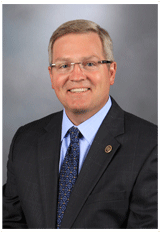Making higher education more accessible and affordable has been a priority for me throughout my time in the Legislature. It was with this goal in mind that I first became involved with the Midwestern Higher Education Compact (MHEC), one of four regional higher education compacts in the United States, which assists its 12 member Midwestern states in advancing higher education through interstate cooperation and resource sharing.
While I was originally appointed a MHEC commissioner in 2003, when I was a Missouri state representative, I was reappointed in 2010, and have since been reappointed in 2011, 2013 and 2015. This week, it was my great honor to assume the position of commission chair during our semi-annual meeting in Chicago. I was elected last fall and served a year term as vice chair (2014-2015), and a term as the Compact’s treasurer (2013-2014).
I am looking forward to leading the Compact as it continues to provide greater higher education opportunities and services to the Midwestern region. Chief among our goals is to increase access to citizens residing in the 12 states we serve. As I have seen first-hand how beneficial these programs have been in my senate district, I am excited to further expand our regional footprint.
Collaborating with Compact members has been instrumental in protecting dual enrollment in my district, which enables high school students to also be enrolled at a local institution of higher learning, such as a community college or university. Students who pass their college classes may receive credit that can be applied toward both their high school diploma and toward a college degree or certificate. Advantages of dual enrollment include getting a head start on college careers; making the transition from high school to college smoother; and making college more affordable by providing a way for students to earn college credits through courses often paid for and taken through their local high school.
Unfortunately, some members of the higher education establishment have been seeking to change the qualification requirements for educators who teach dual enrollment courses. Doing so has the potential to significantly limit dual enrollment opportunities, and that is not good for young people in my district, especially in our most rural school districts. However, with the help of my MHEC colleagues, we have been successful in delaying the call for increased regulation, which would make attaining an advanced degree less affordable and less accessible.
Missouri has been a member of the Compact since May 1990. Missouri higher education institutions, school districts, state and local governments, as well as students and families, have saved over $82 million by using MHEC’s cost-saving programs and services, and its student exchange program. It is a highly esteemed organization, with which I am proud to have long been associated.
As always, please feel free to contact me or my staff with any questions or concerns at any time. We look forward to hearing your comments and suggestions and trying to answer any questions you may have. You can reach us by phone at (866) 277-0882 (toll-free) or (573) 751-2272, or by fax at (573) 526-7381.
Senator David Pearce serves Caldwell, Carroll, Howard, Johnson, Lafayette, Livingston, Ray and Saline counties in the 21st State Senatorial District. |



